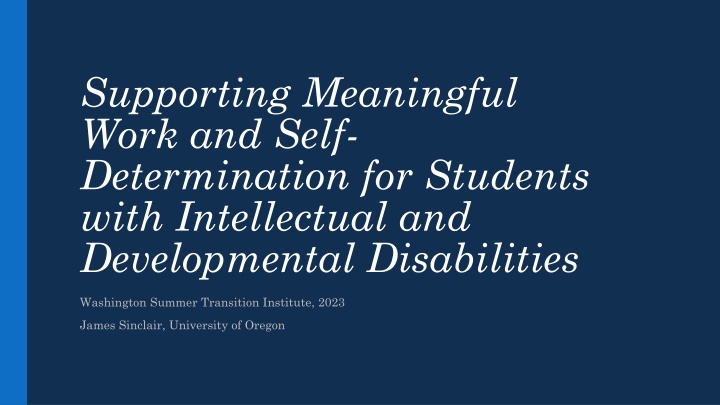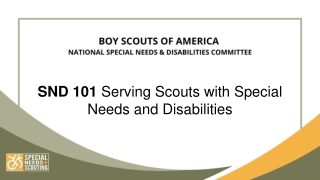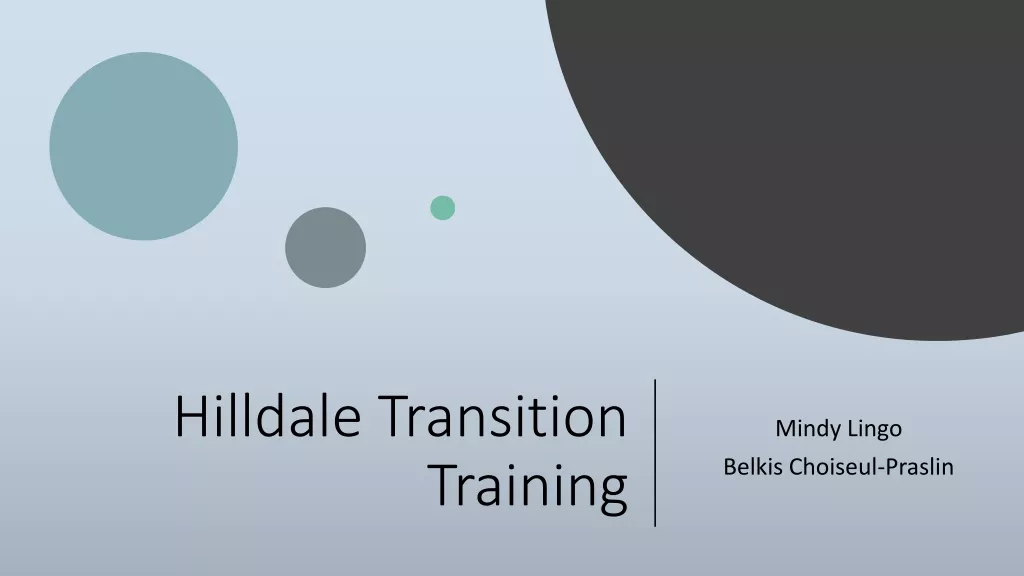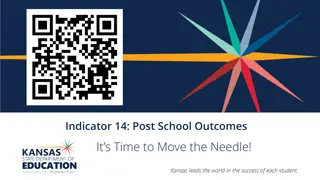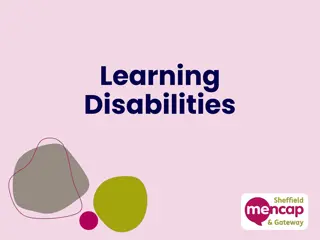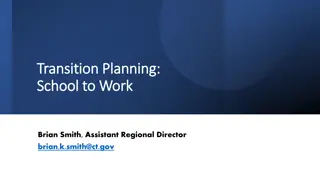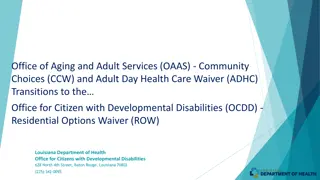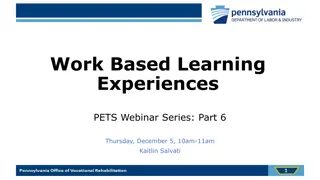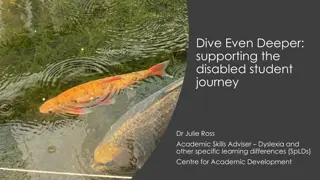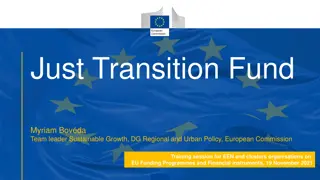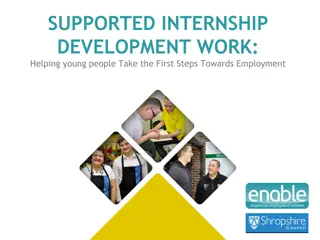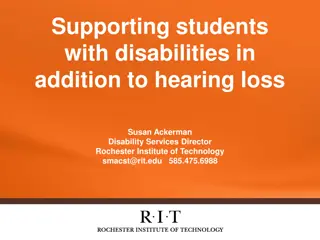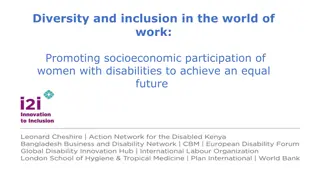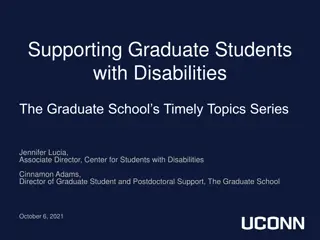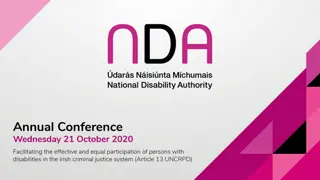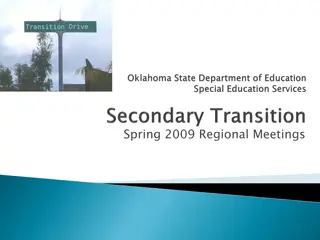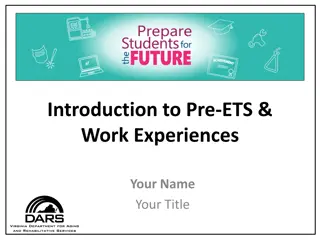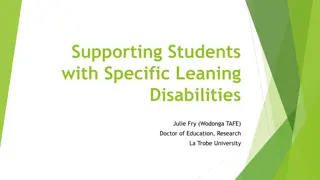Supporting Students with Disabilities in Transition
Challenges faced by students with intellectual and developmental disabilities in transitioning to meaningful work and achieving self-determination. Learn about key findings, socio-economic status implications, transition planning, and employment prospects for these students.
Download Presentation

Please find below an Image/Link to download the presentation.
The content on the website is provided AS IS for your information and personal use only. It may not be sold, licensed, or shared on other websites without obtaining consent from the author.If you encounter any issues during the download, it is possible that the publisher has removed the file from their server.
You are allowed to download the files provided on this website for personal or commercial use, subject to the condition that they are used lawfully. All files are the property of their respective owners.
The content on the website is provided AS IS for your information and personal use only. It may not be sold, licensed, or shared on other websites without obtaining consent from the author.
E N D
Presentation Transcript
Supporting Meaningful Work and Self- Determination for Students with Intellectual and Developmental Disabilities Washington Summer Transition Institute, 2023 James Sinclair, University of Oregon
Agenda Acknowledgement Discussion on employment and ID What is self-determination? What is the Psychology of Working Theory? Findings from our project
Acknowledgement Dr. Carly Gilson Associate Professor at The Ohio State University
A national portrait of work Youth with intellectual disability and multiple disabilities are less likely than all youth with an IEP to have six of the seven key high school experiences or indicators linked to success after high school: (-) Performs activities of daily living well (-) Gets together with friends weekly (-) Participates in a school or club (-) Has taken college entrance or placement test (-) Has recent paid work experience (-) Parent expects youth to live independently (+) has never been suspended NLTS-2012
Socioeconomic Status Youth with ID and EBD are the most socioeconomically disadvantaged groups and the most likely to attend lower- performing schools. According to parents, 72 percent of youth with ID live in low-income households, which is 14 percentage points higher than youth with other disabilities on average NLTS-2012 Findings
Transition Planning Youth with ID have met with school staff to develop a transition plan (67%) at similar rates as students with other disabilities (69%) Youth with ID (42%) provided at least some input in IEP and transition planning at lower rates than their peers with other disabilities (59%) NLTS-2012 Findings
Employment Youth with autism, intellectual disability, and multiple disabilities are least likely to take steps to prepare for employment Compared to other youth with disabilities, those with ID, are half as likely to have paid jobs during high school (22 percent versus 40 percent). NLTS-2012 Findings
Table Question: What is the Self- determination? Answer for yourself: Are you self-determined? Why or Why not? SHARE!
Self-Determination Wehmeyer (1992) initially proposed self-determination as the attitudes and abilities required to act as the primary causal agent in one s life and to make choices regarding one s actions free from undue external influence or interference (p. 305). Early revisions of self-determination included additional behavioral focused language such as a combination of skills, knowledge, and beliefs that enable a person to engage in goal directed, self-regulated, autonomous behavior (Field et al., 1998, p. 2). The functional theory of self-determination depends on the functions of one s actions or behaviors, rather than the skill itself (Wehmeyer, 2005). In other words, it is how and for what purpose self-determined skills are used to support an individual to become the primary causal agent over one s life (Shogren et al., 2015). Viewing self-determination through a causal agency lens highlights the importance of teaching self-determination skills. Teaching self-determined skills allows for individuals to see themselves as change agents who control their own destiny (Shogren et al., 2017).
Now ask yourself: Do I see myself as a change agent that controls my own destiny? Why or why not?
What makes you agentic? How is this different for someone who is not in the dominant cultural group? Someone with a disability? Someone who is racially and ethnically diverse? Someone who is LGBTQ? Someone who experiences intersecting identities?
Group Table Question: Thinking of the people you serve, what systemic issues could prevent young people with ID from being fully self-determined agentic individuals?
Supporting self-determination skill development Shogren (2013) articulated a comprehensive list of behaviors. The behaviors associated with being self- determined included (a) choice-making, (b) decision-making, (c) problem-solving, (d) goal setting and attainment, (e) self-management, (f) self-advocacy, (g) internal locus of control, (h) perceptions of self-efficacy and positive outcome expectancies, and (i) self-awareness and self-knowledge.
Why are we talking about self- determination and employment? Self-determination is an essential skill to develop as it has been associated with increased wages, more hours of work, benefits, retention, and work success and satisfaction (Mueser et al., 2001; Wehmeyer et al., 2011)
What skills do you find yourself focusing in on and why? What skills seem to be the most effective in supporting agency? (a) choice-making, (b) decision-making, (c) problem-solving, (d) goal setting and attainment, (e) self-management, (f) self-advocacy, (g) internal locus of control, (h) perceptions of self-efficacy and positive outcome expectancies, and (i) self-awareness and self-knowledge.
How do we change our mindset in providing services? How do we change employment planning to be more than checking a box?
What is the meaning of work?
The Psychology of Working Working is a central aspect of life, providing a source of structure, a means of survival, connection to others, and optimally a means of self-determination (Blustein, 2006, 2008; Budd, 2011; Juntunen, 2006; Richardson, 1993, 2012). Working functions to provide people with a way to establish an identity and a sense of coherence in their social interactions. Work furnishes part of our external identity in the world. Working also has unique meaning that is derived from and embedded within specific cultural contexts, which shape and are shaped by individual experiences of working. Exemplified by asking: What do you do? when you meet someone for the first time.
The Psychology of Working Working involves effort, activity, and human energy in given tasks that contribute to the overall social and economic welfare of a give culture. Including paid employment as well as work that one does in caring for others within one s family and community. Working has been one of the constants in our lives; the experience of working unifies human beings across time frames and cultures.
An Integrative Taxonomy of Working Working as a means of: 1. survival and power 2. social connection 3. self-determination
Survival and Power Work provides a means for people to survive: Power refers to the actual exchange of work for money this allows for a person to sustain his or her life. Work can be connected to social status leading to enhanced prestige more power
Social Connection Work allows us to form important social relationships and bonds For many people work is the primary setting in which strong interpersonal connections are made Working links people with a broader social network Provides structure in which individuals may interact with others whether in their immediate circle or beyond
Self-determination Work supports an individual s sense of self- determination. People experience self-determination through: Having autonomy, Experiencing competence, and Being relational By following their own intrinsic motivation
Table Chats: From your own experience What aspect of the Psychology of Working theory resonates most to you when reflecting on your own working life? Why, or how is this different for individuals with ID? How would you apply this lens to your work with individuals with ID that you work with? Share out
Purpose of our research To understand the complexity of what work means for individuals with intellectual and developmental disabilities. To apply the taxonomy of the psychology of working specifically to adults with intellectual and developmental disabilities (IDD) Move beyond the scope of work that is, competitive employment for employment sake (as a means to an end), but rather to help understand what meaning individuals get from work. Our goal is to improve career assessments, job experiences, as well as connect individuals to jobs that have meaning.
Research Questions Research Question 1: How are self-determination behaviors described by adults with IDD when discussing their work experiences? Research Question 2: What advice do adults with IDD have for others to obtain employment?
THIS IS REVOLUTIONARY! (just a little bit of sarcasm) Young adults with ID: Utilize self-determination skills Confirm the Psychology of Working Theory Are motivated to work Find social meaning and connections at work Survive and gain power through work
Decision Making Usage of money for: Savings Gifts Donations
Decision Making Making life decisions: And it was really hard for me to get a job, but it took process for me to realize what I want to do in my life is to be lazy, or be a working person. And I was like, I m going to be a working person, so I went through high school with two jobs, and then went to [city] and had two jobs, and since I ve been working my whole life. Erika, Janitorial I quit period, because they seemed like they [weren t] trying to move me up. Teresa, Clerical
Goal Setting Two main categories: Sustaining current employment Setting goals for future employment Wanting to have a food truck Be a sword maker Work with children
Problem Solving Like most people when they encounter a problem participants identified working through a problem with a co-worker or boss. To be focused, . . . Follow directions, ask your boss if you have any questions. Sasha (animal service) John (public service) spoke about the importance of teamwork to solve problems at work, such as learning new things from his coworker: He was training me on how to use the floor scrubber. I d say it was kind of a tricky thing, but then I figured out how to use it the best way.
Self-advocacy Gary (maintenance) expressed, I think you can t be stopped because you are your own person. I don t think your disability should define you, that is what I tell myself. Go push past your limits. Jason (office) voiced the strong desire to be included in the decision-making processes, one thing that has been like such an amazingly coined phrase, is Nothing about me, without me. He stated the need to have employment related benefits explained, I want to be there to hear that information. What coverages am I getting? What benefits are being provided? And how do I use those assets if I m not being told about these things? and was determined to have his voice heard, I want to be as much of an advocate as I can. I want to be able to be as independent as possible.
Advocacy for others Jason (office) mentioned a strong desire and pride in his mission to support others with disabilities, I am proud to be an advocate for those with disabilities. I m proud to be an advocate for anyone that wants to get up and do more than just sit and wander and be idle. Beth (food service) indicated a strong personal connection to be a voice for others, I just want to stand up for others in my own way.
What advice do those working give to others who want a job?
Stay Persistent Teresa stated, oh, my advice I will say be persistent, show that you can do it like everybody else can, and just keep doing it till you get it right. Troy advised, Don t stop and don t quit. When you stop and let something pass you by, it won t come back and if you quit it might be the last you ever get of something. Erika responded, Just keep on going, keep working on it. It will take a process, but just keep positive, and they will know how to get a job. Jeff (distribution/warehouse) stated, Don t stop trying till you succeed. Michael (substitute), Just keep fighting, don t let the boss say no, you can t do it. Just tell them you can and let them give you a chance to show them that you can.
Be Proactive and Take Initiative Shelley (Grocery) explained, Get a job. Don t wait until the last minute to do it. I mean they may not take you right away but it never hurts to do it. Jason echoed I d say go out there, be the individual that you want to be, and guide yourself to the goal you want. Beth emphasized a broader obligation to show society that people with disabilities can work, Get off the couch and get jobs, because jobs are very important to people with disabilities. Not everyone knows about disabilities, so we need to get out there and show them that we can do stuff. Noah (community advocate) wanted people to choose their own path, Don t let others misfortunes, maybe you have friends with disabilities that are like they tried working and it didn t work for [them], don t let that make your decision, you have to try for yourself.
Summarizing From our perspective: Participants were driven to work Participants had a great awareness of themselves in connection to their employment Finding meaningful work meant being happy in their life
Group Question What in your practice allows you to connect with clients/students to go beyond just finding a job, but will help you plan for meaningful work?
Any questions? Thank you! Jamesin@uoregon.edu
